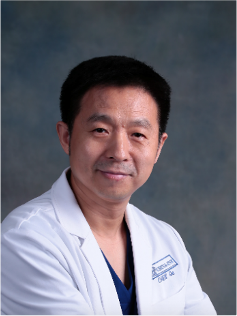
Lecturer
Senior Consultant Neurosurgeon
Skull Base and Brain Tumor Center
Clinical Expertise: Schwannoma,Pituitary Tumor,Meningioma
E-mail: chenge@xwhosp.org
Research Interest
Surgical treatment and molecular biology of aggressive pituitary tumors; investigating the pathogenesis of aggressive pituitary adenomas using whole genome sequencing methods
Background
Dr. Chen graduated from Capital Medical University and received his medical degree in 1992. He completed his neurosurgical residency and chief residency training at Capital Medical University Xuan Wu Hospital in 1999. He went to Germany in 2001 and received his advanced Minimally Invisive Neurosurgery Training in Department of Neurosurgery of Mainz University for half year under the mentorship of Prof. Axel Perneczky. Dr. Chen specializes in surgery for pituitary tumors, craniopharyngiomas and other skull base tumors. He is particularly known for developing and expanding the field of minimally invasive endonasal endoscopic skull base and pituitary surgery. He received Chinese 5th Award of Endoscopic Medical Tech-Science Outstanding Achievement in 2008. Dr. Chen has performed over 1,100 cases of pituitary tumor surgeries and he is also a pioneer in the use of 3D endoscopy in pituitary surgery in China. His clinical focus is on the surgical treatment and molecular biology of aggressive pituitary tumors, and Dr. Chen and his team are currently investigating the pathogenesis of aggressive pituitary adenomas using whole genome sequencing methods. Dr. Chen hold fellowship courses for endoscopic skull base surgery of different time span. Fellows from China and other countries can work with Dr. Chen in the ward and clinics for 3 to 12 months according to their own plan. They are allowed to observe operations in the ORs. For those fellows who will stay longer than 6 months, they are also encouraged to spend at most 2 weeks in the lab to dissect cadaver heads under Storz endoscope and to learn the advanced endoscopic skull base anatomy.
Education
MD, Capital Medical University(1992)
Ph.D, Capital Medical University(2010)
Residency
Capital Medical University Xuan Wu Hospital/ Neurosurgery Department (1999)
Fellowships
Department of Neurosurgery of Mainz University (2001.9-2002.4 Germany)
Division of Pediatric Neurosurgery of Jikei University School of Medicine (2005 Japan)
Board Certifications
Chinese Congress of Neurological Surgeons(CCNS)
Chinese Medical Doctor Association(CMDA)
Research & Publications
1. Chen Ge, Cai LX. Spinal cord tumor with intracranial hypertention. Journal of Capital University of Medical Sciences, 1998,6
2. Chen Ge, Cai LX. Spinal cord compression caused by plasmocytomas. Journal of Capital University of Medical Sciences, 1999,2
3. Li Jianyu, Chen Ge, Ding YJ. Surgical treatment of essential tremor. Journal of Chinese Minimally Invasive Neurosurgery, 2000,3
4. Chen Ge, Ling Feng. Endoscopic endonasal transsphenoidal approach for sellar lesion: An anatomic study. Chinese Journal of Mnimally Invasive Neurosurgery.2005,10(5)
5. Chen Ge, Ling Feng. Endoscopic endonasal transsphenoidal approach for decompression of optic nerve: An aatomic study. Chinese Journal of Clinical Anatomy. 2005,vol 23(4):385-388
6. Chen Ge, Ling Feng, Zhang Qiuhang, Li Meng, Du Jianxin, Zhao Ruilin. Endoscopic endonasal transsphenoidal surgery of pituitary adenomas. Chinese Journal of Neurosurgical Disease Research. 2006, 5(3), 212-214
7. Chen Ge, Zhang Qiuhang, Guo Hongchuang, Kong Feng, Bao Yuhai, Chen Lihua, Chen Ling. Endoscopic pituitary adenoma surgery via a double nostril approach. Chinese Journal of Mnimally Invasive Neurosurgery. 2010,15(7):289-291.
8. Chen Ge, Ling Feng. A new plastic model of endoscopic technique training for endonasal transsphenoidal pituitary surgery. Chinese Medical Journal 2010;123(18):2576-2579
9. Chen Ge, Zhang Qiuhang, Guo Hongchuang, Kong Feng, Liang Jiantao, Wei Yukui,Li Mingchu. Removal of tuberculum sellae meningioma by endoscopic endonasal transsphenoidal approach. Chinese Journal of Minimally Invasive Neurosurgery. 2010,15(9):405-408
10. Chen Ge, Qiuhang Zhang, Feng Ling. An endoscopic endonasal approach for the surgical repair of transsphenoidal cephalocele in children. Journal of Clinical Neuroscience 2011, 18 :723–724
Honors
Chinese 5th Award of Endoscopic Medical Tech-Science Outstanding Achievement in 2008
Memberships
Chinese Medical Association
Chinese Congress of Neurological Surgeons
Chinese Medical Doctor Association
WFNS Neuroendoscopy Committee
Any use of this site constitutes your agreement to the Terms and Conditions and Privacy Policy linked below.
A single copy of these materials may be reprinted for noncommercial personal use only. "China-INI," "chinaini.org" are trademarks of China International Neuroscience Institute.
© 2008-2021 China International Neuroscience Institute (China-INI). All rights reserved.